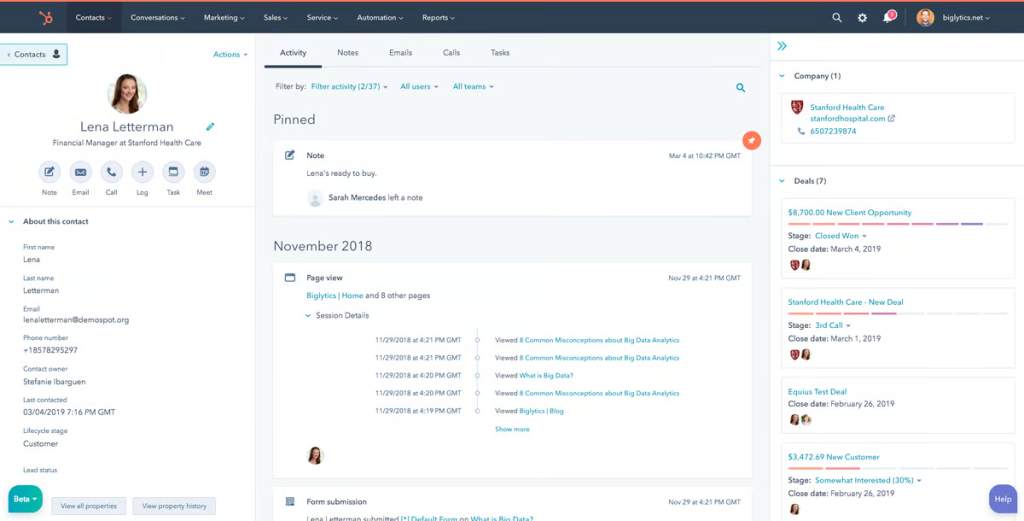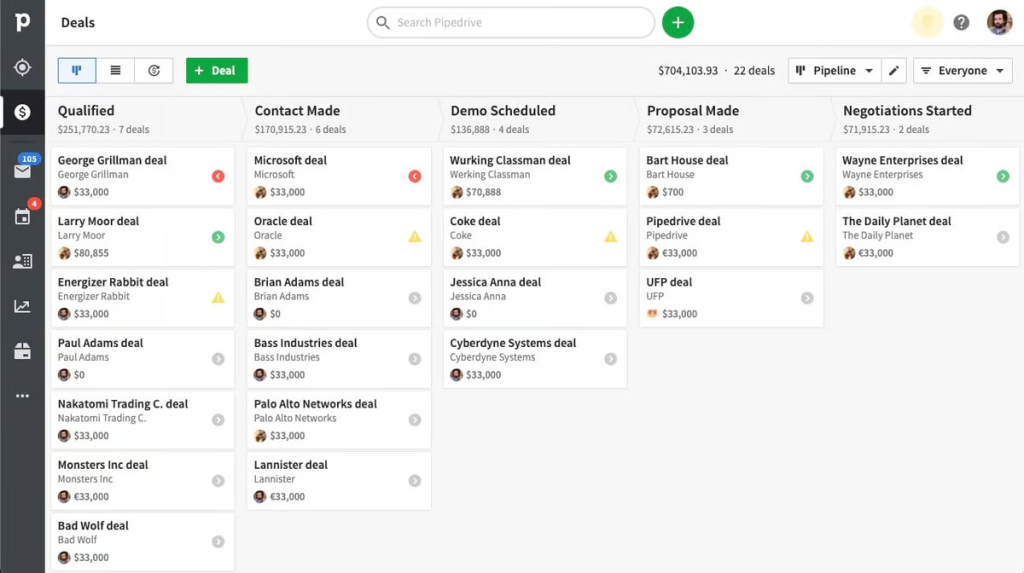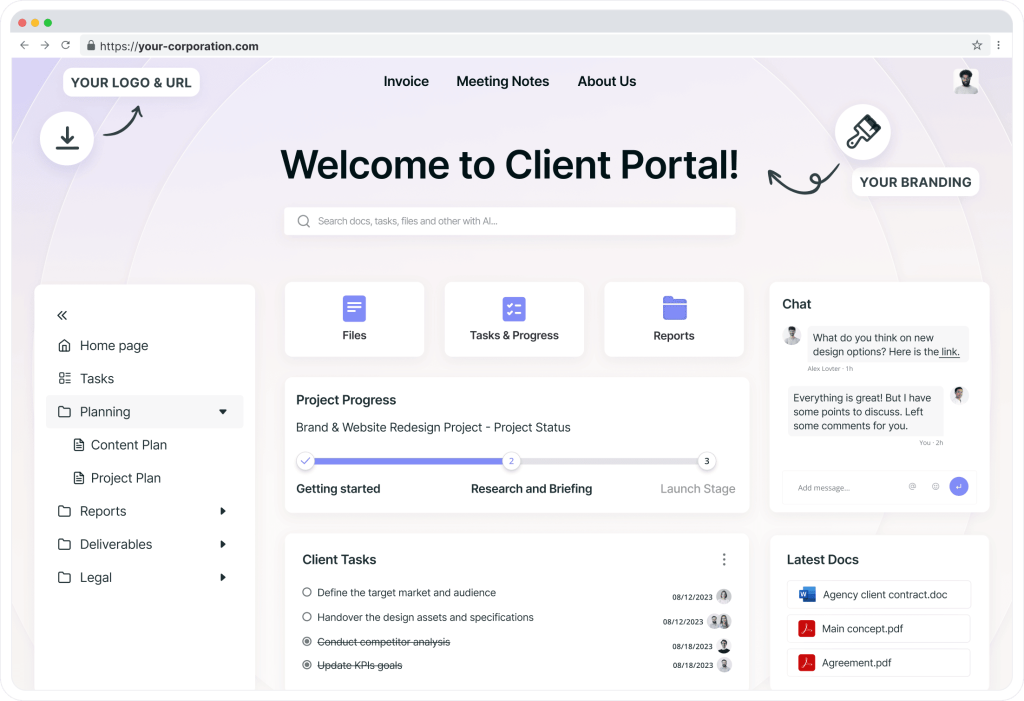
Launching a startup is an exhilarating journey filled with big dreams and ambitious goals. But amidst the excitement, it’s easy to get bogged down by the daily grind of managing customer relationships, tracking leads, and maintaining organized communication.
Miscommunication, lost documents, and project delays can quickly turn into costly headaches. That’s where a Customer Relationship Management (CRM) system comes in. It’s not just a fancy tech buzzword — it’s a powerful tool that can streamline your operations, boost efficiency, and, ultimately, help you build a more successful business.
What is a CRM for Startup Companies?
Think of it as a central hub for all your project information, customer data, and communication. It’s a digital platform that keeps everyone connected in the office or remotely.

A CRM goes beyond just storing contact information. It can track project progress, manage subcontractor relationships, streamline document approvals, and even automate routine tasks. In short, it’s like having a project manager, office assistant, and communication specialist all rolled into one powerful software package.
It’s a powerful tool that can:
- Organize customer information, making it easy to find the details you need when you need them.
- Track interactions with leads and customers, helping you nurture relationships and close deals.
- Automate tasks like email follow-ups and data entry, freeing up your time for more strategic work.
- Analyze customer data to uncover trends and insights, allowing you to make informed decisions.
How Using a CRM Helps Startups
A CRM isn’t just a luxury for established businesses – it’s a game-changer for startups that want to grow and scale quickly.
Strengthened Client Relationships
With a CRM, you can deliver personalized experiences, proactively address customer needs, and build lasting relationships that drive repeat business and referrals.
Personalized Service: Store client preferences, communication history, and project feedback in one place, enabling personalized interactions and targeted follow-ups.
Proactive Communication: Automate client updates, send personalized messages, and provide access to project portals, keeping clients informed and engaged throughout the project lifecycle.
Increased Transparency: Give clients visibility into project progress, budgets, and timelines, building trust and demonstrating your commitment to their satisfaction.
Improved Communication and Collaboration
No more lost emails or missed follow-ups. A CRM centralizes communication, ensuring everyone on your team can access the latest client interactions and collaborate seamlessly.

Seamless Information Sharing: Keep all stakeholders, from project managers to subcontractors to clients, informed and aligned with centralized communication tools. Share updates, documents, and photos in real-time.
Reduced Miscommunication: Eliminate confusion and errors caused by outdated information or misinterpretations. Everyone can access the latest project details, reducing the risk of costly rework.
Improved Collaboration: Foster a collaborative environment where team members can easily share ideas, provide feedback, and work together seamlessly, regardless of their location.
Enhanced Project Management
Automate repetitive tasks, eliminate manual data entry, and optimize your sales process to close deals faster and more efficiently, allowing you to focus on core business activities.

Centralized Hub: A CRM is a single source of truth for all project-related information. From blueprints and contracts to change orders and daily logs, everything is stored in one easily accessible location.
Real-Time Tracking: Stay on top of project progress, milestones, and deadlines with real-time updates and notifications. Quickly identify potential bottlenecks or delays and take proactive measures to keep projects on track.
Resource Optimization: Allocate resources effectively by tracking availability, workload, and skillsets. Ensure the right people and equipment are assigned to the right tasks at the right time.
Financial Clarity: Track project budgets, expenses, and invoices in real-time. Gain insights into profitability and make informed financial decisions.
Data-Driven Insights and Decision-Making
Gain a deeper understanding of your customers, their preferences, and their pain points. This will allow you to tailor your marketing and sales efforts for maximum impact. Track key metrics like lead conversion rates, customer lifetime value, and sales revenue to measure progress and identify areas for improvement.
5 Signs Indicating You Need a CRM
Let’s be honest – startup companies can be a whirlwind of activities. If you’re nodding along to these five telltale signs, it might be time to consider a CRM as your trusty sidekick:
1. Scattered Data and Communication
If crucial information resides in disparate systems, emails, or physical documents, a CRM can centralize everything, making it easily accessible to your team.
2. Difficulty Tracking Project Progress
For professionals struggling to manage multiple projects simultaneously, a CRM can provide a consolidated view, highlighting potential bottlenecks and enabling timely interventions.

3. Inefficient Client Management
If client communication is fragmented or reactive, a CRM can automate updates, personalize interactions, and ensure a seamless client experience. For those struggling to manage leads and opportunities or losing track of client interactions, a CRM can provide a clear, organized view of your sales pipeline.
4. Manual Processes and Redundant Tasks
Does your team spend a lot of valuable time on repetitive tasks like data entry? A CRM can automate these processes, freeing up resources for more strategic activities.
5. Limited Visibility into Business Performance
For those who lack actionable insights into business operations, a CRM can provide robust reporting and analytics tools to track key metrics and identify areas for improvement.
Must-Have CRM Features for Your Business
Selecting the right CRM is like choosing the perfect tools for your toolbox – each one serves a specific purpose in successfully finishing a project. Here’s a breakdown of the must-have features that can elevate your startup to new heights:
| Project Management | Gantt Charts & Kanban Boards Budget Tracking Resource Allocation Change Order Management |
| Document Management | Centralized Storage Version Control Permissions & Access Control Integration with e-Signature Tools |
| Client Collaboration | Personalized Communication Automated Updates Client Portals Issue Tracking & Resolution |
| Integration Capabilities | Multimedia Embedding Connecting Other Tools Integrating Platforms and Resources |
| Reporting & Analytics | Customizable Dashboards Project Performance Reports Forecasting Tools Integration with BI Tools |
5 Best CRM Solutions for Startups in 2024
Selecting the right CRM for your startup is like choosing a co-founder – you want someone who complements your strengths, understands your vision, and helps you reach your goals. Here’s an in-depth look at the top 5 CRM contenders in 2024, each with unique strengths that cater to different startup needs.
Asana
Asana’s strength lies in its adaptable project views, including lists, boards, and timelines. Its robust automation features allow you to streamline repetitive tasks, and its emphasis on team collaboration makes it ideal for projects with multiple contributors.

However, smaller companies or those with simpler projects might find its extensive capabilities to be overkill. Its vast array of features might be overwhelming for startups with simpler needs or limited resources.
monday.com
monday.com’s intuitive drag-and-drop interface empowers you to design custom dashboards and workflows that align perfectly with your business. It boasts a massive library of integrations, allowing you to connect with your favorite tools and streamline your operations. Automation features further enhance efficiency, freeing you from repetitive tasks.

While monday.com’s flexibility is a major selling point, the sheer amount of customization might require a steeper learning curve, especially for teams new to CRM software.
HubSpot
HubSpot’s free plan is a generous starting point for startups, offering essential CRM features like contact management, lead tracking, email marketing, and basic reporting. You can upgrade to paid plans for more advanced features like marketing automation, social media management, and SEO tools as you grow.

Although HubSpot offers a wide range of features, its complexity can be overwhelming for some startups. The cost can quickly escalate as you add more users and advanced features.
Pipedrive
Pipedrive’s visual pipeline provides a clear overview of your sales process, making it easy to identify bottlenecks and prioritize opportunities. Its intuitive interface and sales-centric features, like email integration and activity tracking, are designed to help you close deals faster.

Pipedrive excels at sales management, but it might not be the best fit for startups that need more robust marketing or customer service features.
FuseBase
FuseBase’s unique strength lies in its all-in-one approach to client collaboration. It seamlessly integrates client portals, internal workspaces, project management tools, and AI-powered insights, creating a centralized hub for all your business needs. It combines the capabilities of a CRM with comprehensive project management tools.
- Client Portals: Create secure, personalized portals for clients to access project information, communicate, and collaborate.
- Project Management: Plan, track, and manage construction projects with features like Kanban boards, task lists, and resource allocation.
- Document Management: Store, organize, and share project documents, blueprints, contracts, and other files.
- Communication & Collaboration: Centralized communication hub with messaging, comments, and notifications to keep everyone in the loop.
- Forms & Surveys: Create custom forms and surveys to gather data from clients, subcontractors, and team members.
- Business Knowledge Base: Build a centralized repository of project information, company policies, and best practices.

With features like customizable templates, integrations with popular tools, and a business knowledge base, FuseBase empowers startups to build stronger client relationships and achieve their goals faster.
FuseBase is a relatively new player in the market, so it may not have the same level of brand recognition as some of the more established CRMs. However, its unique features and focus on client collaboration make it a compelling option for startups looking for a fresh approach. FuseBase Portals is one of the best alternatives to Google Sites and a compelling alternative to traditional CRMs and website builders. It starts for free and scales up with affordable plans.
Summing Up
Consider your startup’s specific needs, budget, and team preferences when selecting a CRM. Take advantage of free trials or demos to test out different platforms and find the one that best aligns with your goals and growth strategy.
With the right CRM, you can transform your startup into a well-oiled machine with streamlined processes, improved communication, and a focus on building strong customer relationships. Invest in a CRM today, and watch your startup thrive.
